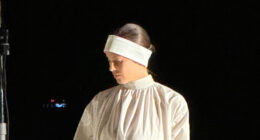The Sydney gym I arrive at describes a sound bath as a practice that “offers you space to nap without guilt”. Despite already being one to nap with a clear conscience, I arrive for a 45-minute session on a Monday night, keen to experience a gentle yoga session with vibrations from crystal singing bowls.
In a soothing voice, Nissa the instructor advises those who are sensitive to sound to make their way to the back of the room. It’s time to make a sound decision and I decide to park myself right in front of her U-shape of seven bowls to feel the maximum impact of the vibrations.
A yoga component takes place before Nissa plays the sound bowls. To prepare, we each gather a selection of yoga equipment. It’s my first time, so I overprepare and choose something from every shelf: two blocks, a long bolster, a towel and a thick blanket. I am two chairs short of a blanket fort with fairly decent lumbar support.
In the dim room, we go from lying in a butterfly pose – legs apart, knees bent, feet touching – to kneeling on all fours for a cat-cow stretch (back arched, back lowered). Then the yoga part is over and the equipment is not so much for exercise as for comfort during the upcoming 30-minute sound bath lie-down. It bolsters the idea we are doing yoga (hello, guilt-free nap!).
Sign up for the fun stuff with our rundown of must-reads, pop culture and tips for the weekend, every Saturday morning
Nissa tells us to relax and keep breathing. “If anything comes up and you feel overwhelmed, move your body, or step out of the room if you need to,” she says.
She explains the seven crystal bowls relate to different energy points along the spine called chakras. For example, at the base of the spine is the sacrum area which corresponds with the biggest bowl’s earthy vibrations. These can make you feel more grounded. As the bowls get smaller and the pitches become higher and lighter, they reach all the way to the top chakra, which is associated with freedom.
“Hopefully these sounds free the energy gate and help you rest and deepen recovery, both mentally and emotionally,” Nissa says.
The first note rings loud and clear and begins to thrum and warp; it’s the sound on the radio when you turn the dial between stations. It’s punctuated by several glockenspiel-like staccato notes making their way up the scale like an intro to a public service announcement. It’s much louder than I expect. I feel the vibrations intensely on my chest, as if someone is pushing down on it, and my ears ring. As the music becomes louder, my first thought is: “Danger, danger.”
Soon, however, I adjust to the volume and force of the vibrations and am surprised at how many sensations and visions enter my mind. I think of Amélie in the French film dipping her hand in a sack of lentils, except now it’s my hand in a sack of lentils, and now the sack is full of pebbles, then snails, then cherry tomatoes. I think of whales singing to each other about lunch. I picture a wall filled with coloured felt artworks in a primary school classroom. I think of floating in space.
after newsletter promotion
In contrast to meditating in silence, here there is something to observe apart from the sound of people breathing. With every sound Nissa creates, I ask myself: what does that sound like? What do those long beeps sound like? That sounds like a truck reversing. Oh, hold on. That actually is a truck reversing. I felt that right in the sacrum: you can’t get more grounded than hearing a truck.
Eventually, I feel my body sink into the floor. I imagine lying in an orchestra pit while they tune up before a performance before they all end in unison on “A”.
After 25 minutes, there are several minutes of silence. Then Nissa closes the class by chanting in Sanskrit: “May our thoughts, words, actions contribute to happiness to all beings.”
I feel much too relaxed for a Monday night. It would have been more appropriate for me to show up to this gym in pyjamas. Maybe one person’s guilt-free nap is another person’s workout.





